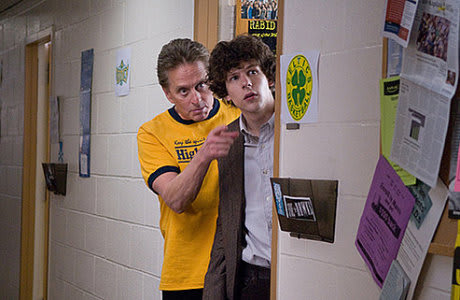Seeing as Solitary Man is a dram-edy starring Michael Douglas as a man past his prime coming to terms with mortality as his playboy years of success and power end, the knee-jerk reaction is to compare it to Wonder Boys. But along with being a superior film, Boys understood the world surrounding its protagonist, finding the humour and arbitrariness of a man struggling to exist in a culture designed for him, while this story of divorced car magnate Ben Kalmen (Douglas) is exceedingly myopic.
Fortunately, it's packaged with sharp dialogue and a commendable balancing of comedy and drama, as Ben responds to a disconcerting visit to the doctor by acting on id impulses, screwing any girl he can and fucking over the system that has sustained him for decades. This alone would be an indulgent exercise in male fantasy, but this borderline tragedy is more about the effects of these actions than the catharsis they bring in the moment.
The film starts out with Ben trying to rebuild his empire after some fraudulent car financing schemes have left him a public and financial failure. Regardless, he still uses what's left of his charm to exploit Jordan (Mary-Louise Parker), the daughter of an influential man, only to screw that up by banging her teenage daughter, Allyson (Imogen Poots). Meanwhile, he hits up his daughter Susan (Jenna Fischer) for money, when not trolling college campuses and bars for younger women.
Despite playing a detestable and irredeemable character, Douglas pulls it off with what little humanity there is to extract, not backing down from some of the more undignified and embarrassing realities of an aging man living youthfully. Everyone around him delivers the sharply written, incisive insults and engineered sagacity with aplomb, making their mere cipher status as ego reflection for moral purposes far more digestible.
And while the film is fully engrossing for its duration, featuring some standout moments with Olivia Thirlby and Danny DeVito, as they point out that serving only yourself without thought of consequence will essentially leave you alone in the world, the end statement about manhood is more amusing than profound.
What's clear here, especially in the final moments, when the motivations are literally spelled out for those devoid of basic deductive skills, is that the only perspective here is that of entitled men. It's also clear that this is not merely an artistic choice, rather it is narrow-mindedness implicit from conception.
(Alliance)Fortunately, it's packaged with sharp dialogue and a commendable balancing of comedy and drama, as Ben responds to a disconcerting visit to the doctor by acting on id impulses, screwing any girl he can and fucking over the system that has sustained him for decades. This alone would be an indulgent exercise in male fantasy, but this borderline tragedy is more about the effects of these actions than the catharsis they bring in the moment.
The film starts out with Ben trying to rebuild his empire after some fraudulent car financing schemes have left him a public and financial failure. Regardless, he still uses what's left of his charm to exploit Jordan (Mary-Louise Parker), the daughter of an influential man, only to screw that up by banging her teenage daughter, Allyson (Imogen Poots). Meanwhile, he hits up his daughter Susan (Jenna Fischer) for money, when not trolling college campuses and bars for younger women.
Despite playing a detestable and irredeemable character, Douglas pulls it off with what little humanity there is to extract, not backing down from some of the more undignified and embarrassing realities of an aging man living youthfully. Everyone around him delivers the sharply written, incisive insults and engineered sagacity with aplomb, making their mere cipher status as ego reflection for moral purposes far more digestible.
And while the film is fully engrossing for its duration, featuring some standout moments with Olivia Thirlby and Danny DeVito, as they point out that serving only yourself without thought of consequence will essentially leave you alone in the world, the end statement about manhood is more amusing than profound.
What's clear here, especially in the final moments, when the motivations are literally spelled out for those devoid of basic deductive skills, is that the only perspective here is that of entitled men. It's also clear that this is not merely an artistic choice, rather it is narrow-mindedness implicit from conception.
